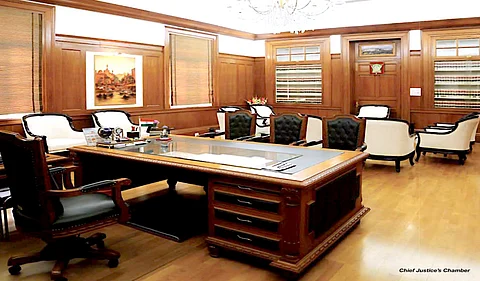
- News
- Columns
- Interviews
- Law Firms
- Apprentice Lawyer
- Legal Jobs
- हिंदी
- ಕನ್ನಡ

In Re: Matter Of Great Public Importance Touching Upon The Independence Of Judiciary
Sexual harassment at the workplace is rampant and hard to prove. When perpetrated by someone who you look up to and revere, it can be devastating. Sexual harassment by a superior, a mentor, or a dominant professional figure is hard to confront, let alone complain about.
Do I think sexual harassment exists in the judiciary? Yes, it does, like in all other workplaces. In my seven years of legal journalism, I have heard horror stories of women (and yes, it is overwhelmingly women) being harassed in law firms, lawyers’ chambers, the lower judiciary, and the higher judiciary (the high courts).
What is troubling me here?
This time, it’s the Chief Justice of India who is the accused. The office of Chief Justice of India is in some ways the most significant office in this country – more significant than even that of the President or the Prime Minister – because it is he (thus far, it has always been a he) who is the ultimate protector of my fundamental rights. He guarantees my constitutional rights like no other person in this country, like no other officer under the Constitution.
Could the sexual harassment complaint against the CJI be false? Yes, of course. Could it be true? Yes. In all likelihood, by the time the charge is proven against the Chief Justice of India, or for that matter, any judge of the Supreme Court, their term would have come to an end.
So, on one hand, is the story of a woman who is alleging sexual harassment, and on the other, the CJI’s denial of the same. How has it come to this?
The Saturday hearing
Should the Chief Justice of India have convened a bench of the three or five senior-most judges and let them determine a course of action in conformity with law? Would anyone have questioned the CJI if that had been the case? Should the matter have been taken up on the judicial side in the first place?
These are questions to which we will never know the answers, owing to the way things went down in the Supreme Court on Saturday. By convening and chairing a bench arbitrarily, chosen at a random hour, without notice to the complainant, has the CJI laid himself open to questions regarding basic procedural errors?
Whether or not one supports the Chief Justice of India, there is still time to support the office of the Chief Justice of India. Whenever this case is taken up – if it comes before a bench of the senior-most judges of the Supreme Court – there is still time to remedy the procedural irregularities that occurred on Saturday. If a procedure is to be adopted, could the CJI not consider convening a bench of the seniormost judges, or formed a committee of three or five former Chief Justice of India? There are many steps the CJI could take within the Constitution to assure the nation that he is not acting as a judge in his own cause; they should be taken, and taken swiftly.
The office of the Chief Justice of India is far too important to be demeaned. If we reduce this Constitutional office to low standards, our future itself is at stake. To protect the office of the Chief Justice of India and the future judges of the Hon’ble Supreme Court, we need to deal with the problem of sexual harassment in a more transparent manner.
Taken to their conclusion, legal proceedings usually have winners and losers, but when transparency is compromised, the greatest loss is to the judiciary and the nation’s trust in the legal process.
Image Courtesy: Supreme Court Annual Report
Pallavi Saluja is Editor at Bar & Bench. She tweets @pallavibnb